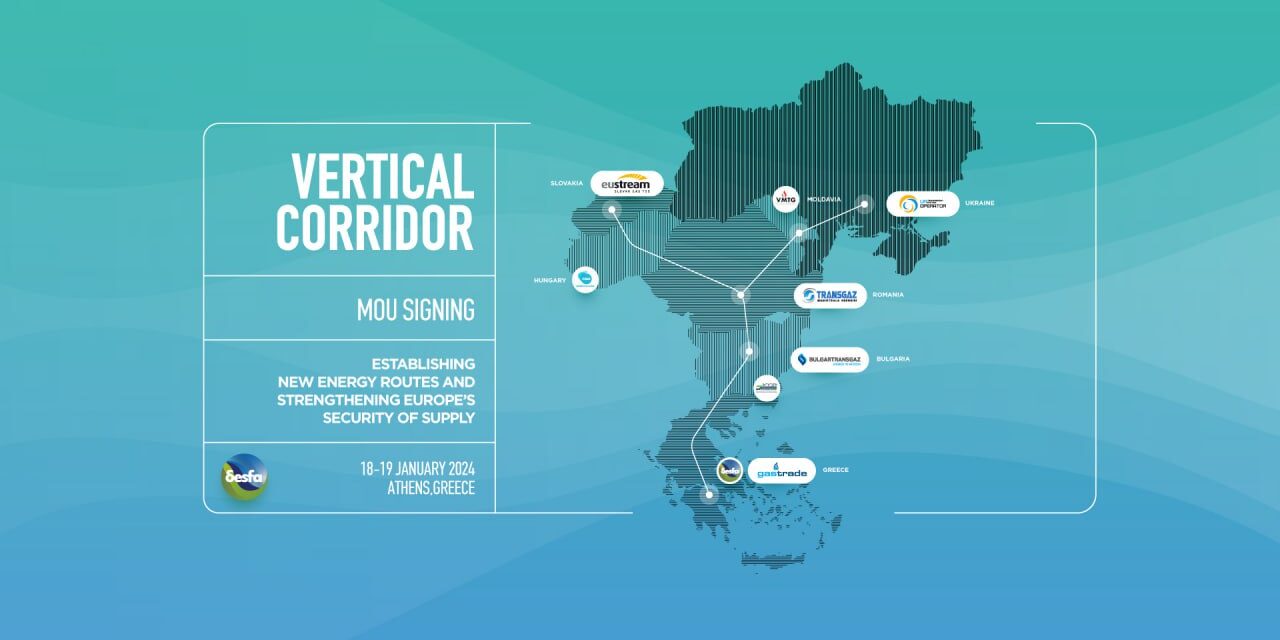Greece, Bulgaria, Romania, Hungary, Slovakia, Moldova, and Ukraine all form part of the Vertical Natural Gas Corridor, an ambitious project that aims to enhance energy security in SE and Central Europe and to increase Europe’s energy infrastructure.
Its foundations were laid back in 2022 during the “World LNG Forum and Awards 2022,” organized by the Natural Gas System Operators of Greece (DESFA). The National Operators of Greece (DESFA), Romania (Transgaz), Bulgaria (Bulgartransgaz) and Hungary (FGSZ), together with the Interconnector Greece-Bulgaria (IGB) and the Alexandroupolis Floating Storage and Regasification Unit (FSRU) project operators, signed a Memorandum of Understanding to deepen cooperation in the energy field. Ukraine, Moldova and Slovakia joined the Vertical Gas Corridor last January, in the sidelines of the Ministerial Meeting of Central and Southeastern Europe Energy Connectivity (CESEC) that took place in Athens.
The “Vertical Natural Gas Corridor” is a big gas pipeline system made up of existing and future infrastructure for natural gas. This includes pipelines, terminals for liquefied natural gas (LNG), and natural gas storage facilities. Its purpose is to transfer natural gas from Azerbaijan (through the Trans-Adriatic Pipeline or TAP) and LNG from trusted sources such as the US and Egypt towards Europe. The Vertical Corridor starts in Greece, passes through Bulgaria and reaches countries in Central, Eastern, and Southeast Europe, helping them to reduce and phase out their dependence on Russian hydrocarbons.

The illegal and unprovoked attack on Ukraine has elevated the issue of European energy security into a very high priority. At the same time, devastating wildfires and floods in Greece and the Mediterranean have highlighted the challenge of climate change and the need for transition to cleaner energy sources. Decreasing Europe’s reliance on Russian hydrocarbons and tackling climate change are major priorities.
Greece’s geographical location and its proximity to major gas-producing regions, such as the Eastern Mediterranean, further enhance its role in the vertical gas corridor.
In October 2022, a big moment for the “Vertical Natural Gas Corridor” was the inauguration of the Greece-Bulgaria Natural Gas Interconnector (IGB), a milestone project that is reshaping the “energy map” of the wider region. Additionally, the Alexandroupolis floating, storage, and regasification unit (FSRU) that is Greece’s second import gate of liquefied natural gas – following the recently upgraded Revithoussa terminal – will soon become fully operational. Greece thus expects to double its LNG liquefaction capacity, further positioning itself as a crucial transit hub for gas supplies destined for Europe. As such, Greece stands to play a pivotal role in shaping the future of Europe’s energy landscape through the development of the vertical gas corridor.
This is an article taken from Greece In America, the official newsletter of the Embassy of Greece in Washington.
Read also via Greek News Agenda: Alexandroupolis: a new energy and transportation hub for Greece; Marika Karagianni: “Greece can become a natural gas transportation hub”












